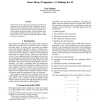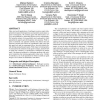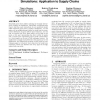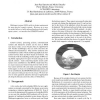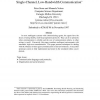104
click to vote
AAAI
2008
15 years 4 months ago
2008
Game theory has been playing an increasingly visible role in computer science in general and AI in particular, most notably in the area of multiagent systems. I briefly list the a...
127
Voted
ATAL
2009
Springer
15 years 6 months ago
2009
Springer
Many real-world applications of multiagent systems require independently designed (heterogeneous) and operated (autonomous) agents to interoperate. We consider agents who offer bu...
115
click to vote
E4MAS
2006
Springer
15 years 6 months ago
2006
Springer
Indirect interactions have been shown to be of interest in MultiAgent Systems (MAS), in the simulation area as well as in real apns. The environment is also emerging as a first-ord...
135
click to vote
ATAL
2006
Springer
15 years 6 months ago
2006
Springer
Empirical game theory allows studying the strategic interactions of agents in simulations. Specifically, traditional game theory describes such interactions by an analytical model...
119
Voted
IAT
2007
IEEE
15 years 6 months ago
2007
IEEE
Multiagent systems (MAS) satisfy to design requirements for open physical complex systems. However, up to now, no method allows to build software/hardware hybrid multiagent system...
113
click to vote
ATAL
1997
Springer
15 years 6 months ago
1997
Springer
Abstract. We address the problem of constructing multiagent systems by coordinating autonomous agents, whose internal designs may not be fully known. We develop a customizable coor...
261
Voted
CRW
1998
Springer
15 years 6 months ago
1998
Springer
In most multiagent systems with communicating agents, the agents have the luxury of using reliable, multi-step negotiation protocols. They can do so primarily when communication i...
115
click to vote
ROBOCUP
2001
Springer
15 years 7 months ago
2001
Springer
We introduce Biter, a platform for the teaching and research of multiagent systems’ design. Biter implements a client for the RoboCup simulator. It provides users with the basic ...
124
Voted
PRIMA
2001
Springer
15 years 7 months ago
2001
Springer
One of the most appealing features of multiagent technology is its natural way to modularise a complex system in terms of multiple, interacting and autonomous components. As a natu...
122
click to vote
LADS
2009
Springer
15 years 7 months ago
2009
Springer
—Open multiagent systems consist of autonomous agents that are built by different vendors. In principle, open multiagent systems cannot provide any guarantees about the behaviors...
